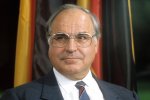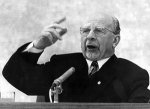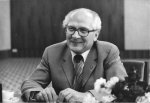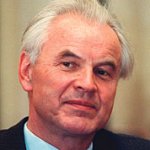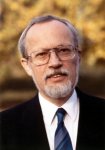German guy
DP Veteran
- Joined
- Jun 9, 2010
- Messages
- 5,187
- Reaction score
- 4,255
- Location
- Berlin, Germany
- Gender
- Male
- Political Leaning
- Moderate
An American pen pal asked me to write him a few things about the past German Chancellors. Since I've written it already, I thought I'd post it here too, as maybe some of you are interested.
I try to be really fair about the different Chancellors, mention both their good and bad decisions, although you might notice I have a preference for the center-left. Here it goes:
Here is a chart about the votes of the different parties since 1949:

You can see that the Christian Democrats (CDU/CSU -- black) became the strongest party in most elections. But due to proportional representation, that doesn't mean they'll always get the government: When smaller parties agree on a coalition encompassing more than 50% of the seats, they can well get the government too. It's the alliance that matters, not one party alone.
The center-right CDU/CSU governed from 1949 to 1969, again from 1982-1998 and again since 2005 (most of the time with the libertarian FDP as junior partner).
The center-left SPD governed from 1969-1982 (with the FDP as junior partner) and from 1998-2005 (with the Greens as junior partner).
Here short portraits of the Chancellors:
Konrad Adenauer (center-right CDU) 1949-1963:

Adenauer was perhaps the closest person to a "Founding Father" the Federal Republic had. After the horrors of Nazi rule and WW2, he was the first Chancellor in a new, democratic (West-)Germany and had to win over the people for the new free system.
He was very old already (73 when he assumed office, 87 when he left it!) and thus had a natural authority spanning generations -- senior 10 years even to Hitler and already active in the Kaiserreich in the 1900s (mayor of Cologne). His entire attitude was very authoritarian too, so many old Nazis were won over to embrace democracy. He was extremely conservative and running on a very anti-communist platform during the Cold War. For example, his government refused to acknowledge East-Germany and kept calling it "Soviet Zone", and they would break diplomatic relations with all countries that recognized East-Germany.
At the same time, he took many very important decisions for West-Germany, such as the integration of the country into the West: During his rule, Germany joined UN and NATO, and the European Community (the precursor of the EU). He took many efforts to reconcile Germany with Western enemies of WW2, especially France (he became a close friend of French President DeGaulle) and offered reparations to Israel.
He was very popular, because during his time, there was an economic boom ("the wonder") in West-Germany and most Germans became more wealthy than they had ever been before.
But especially towards the end of his chancellorship (he was in office for 3.5 terms), younger people were very fed up with him, they saw him as a dinosaur from the past, because of his very authoritarian attitude, and also, because he hardly ever mentioned the Nazi past -- during his rule, it was more or less an unwritten rule not to talk about the war. Many of his supporters were former Nazis who had exchanged their anti-semitic slogans with Catholic slogans, and who would rather mourn about the German victims of WW2 than admitting guilt.
His junior partner were the moderate libertarians of the FDP most of the time.
Ludwig Erhard (center-right CDU) 1963-1966:
He had been minister for the economy in Chancellor Adenauer's conservative government from 1949 to 1963. As economy expert, he was most popular, people loved him, because they felt he had greatly contributed to the "economic miracle" of the 50s. But it turned out that he wasn't suited as Chancellor. He didn't have the nerves for that office, made a few gaffes and the economy got worse too. So he resigned after 3 years.
Kurt-Georg Kiesinger (center-right CDU) 1966-1969:

Erhard (left) and Kiesinger (right)
Kiesinger is perhaps best remembered for the fact he had been a low-rank Nazi party member until 1945. When that was revealed, many protested against him. A young woman even gave him a slap in the face in front of running cameras, calling him "Nazi". That caused some uproar. In the end, Kiesinger could present Nazi documents that revealed his superior Nazis considered him "unreliable", because he "sabotaged anti-Jewish actions". That more or less saved him -- but not in the eyes of the libertarian FDP, which turned towards the SPD, and not in the eyes of the voters, who diselected him narrowly in 1969.
Willy Brandt (center-left SPD) 1969-1974:

Brandt was the first post-war Chancellor from the left, and in some regards, the left counterpart to Adenauer. Some called him "the German Kennedy", because he was the dream candidate of the younger generation. He was very charismatic. His style was very modern and much less authoritarian, and he finally accepted German guilt: When visiting the Warsaw memorial in Poland, he fell on his knees (many on the right called him a traitor because of that). Also, he had a moral integrity his predecessors were lacking, because he had been in exile in Sweden during the Nazi time, where he was engaged in socialist anti-Nazi actions.
He also tamed the previous anti-communism and opened diplomatic relations to the East Bloc and East-Germany, following the policy of detente towards the East the US under Kennedy had started. That brought many improvements for families that had been cut apart by the Berlin Wall.
He also made many domestic reforms, his slogan was "let's dare to be more democratic!". He reduced legal discrimination of women, an abortion compromise was found (legal within the first trimester), homosexuality was no longer punished with prison, and democratic institutions were enacted at schools and universities. Worker and employee rights were improved too.
All this made him very popular, and thanks to him, his center-left SPD became strongest party in the 1972 elections for the first time. But he left office with a dark spot: Soon, there were rumors in the press about various extramarital affairs. But worse, it was revealed in 1974 that one of his closest confidents was a spy for the communist East. Because of that, he resigned.
His junior partner was the libertarian FDP too -- their social liberal left-wing was dominant during the 70s.
I try to be really fair about the different Chancellors, mention both their good and bad decisions, although you might notice I have a preference for the center-left. Here it goes:
Here is a chart about the votes of the different parties since 1949:

You can see that the Christian Democrats (CDU/CSU -- black) became the strongest party in most elections. But due to proportional representation, that doesn't mean they'll always get the government: When smaller parties agree on a coalition encompassing more than 50% of the seats, they can well get the government too. It's the alliance that matters, not one party alone.
The center-right CDU/CSU governed from 1949 to 1969, again from 1982-1998 and again since 2005 (most of the time with the libertarian FDP as junior partner).
The center-left SPD governed from 1969-1982 (with the FDP as junior partner) and from 1998-2005 (with the Greens as junior partner).
Here short portraits of the Chancellors:
Konrad Adenauer (center-right CDU) 1949-1963:

Adenauer was perhaps the closest person to a "Founding Father" the Federal Republic had. After the horrors of Nazi rule and WW2, he was the first Chancellor in a new, democratic (West-)Germany and had to win over the people for the new free system.
He was very old already (73 when he assumed office, 87 when he left it!) and thus had a natural authority spanning generations -- senior 10 years even to Hitler and already active in the Kaiserreich in the 1900s (mayor of Cologne). His entire attitude was very authoritarian too, so many old Nazis were won over to embrace democracy. He was extremely conservative and running on a very anti-communist platform during the Cold War. For example, his government refused to acknowledge East-Germany and kept calling it "Soviet Zone", and they would break diplomatic relations with all countries that recognized East-Germany.
At the same time, he took many very important decisions for West-Germany, such as the integration of the country into the West: During his rule, Germany joined UN and NATO, and the European Community (the precursor of the EU). He took many efforts to reconcile Germany with Western enemies of WW2, especially France (he became a close friend of French President DeGaulle) and offered reparations to Israel.
He was very popular, because during his time, there was an economic boom ("the wonder") in West-Germany and most Germans became more wealthy than they had ever been before.
But especially towards the end of his chancellorship (he was in office for 3.5 terms), younger people were very fed up with him, they saw him as a dinosaur from the past, because of his very authoritarian attitude, and also, because he hardly ever mentioned the Nazi past -- during his rule, it was more or less an unwritten rule not to talk about the war. Many of his supporters were former Nazis who had exchanged their anti-semitic slogans with Catholic slogans, and who would rather mourn about the German victims of WW2 than admitting guilt.
His junior partner were the moderate libertarians of the FDP most of the time.
Ludwig Erhard (center-right CDU) 1963-1966:
He had been minister for the economy in Chancellor Adenauer's conservative government from 1949 to 1963. As economy expert, he was most popular, people loved him, because they felt he had greatly contributed to the "economic miracle" of the 50s. But it turned out that he wasn't suited as Chancellor. He didn't have the nerves for that office, made a few gaffes and the economy got worse too. So he resigned after 3 years.
Kurt-Georg Kiesinger (center-right CDU) 1966-1969:

Erhard (left) and Kiesinger (right)
Kiesinger is perhaps best remembered for the fact he had been a low-rank Nazi party member until 1945. When that was revealed, many protested against him. A young woman even gave him a slap in the face in front of running cameras, calling him "Nazi". That caused some uproar. In the end, Kiesinger could present Nazi documents that revealed his superior Nazis considered him "unreliable", because he "sabotaged anti-Jewish actions". That more or less saved him -- but not in the eyes of the libertarian FDP, which turned towards the SPD, and not in the eyes of the voters, who diselected him narrowly in 1969.
Willy Brandt (center-left SPD) 1969-1974:

Brandt was the first post-war Chancellor from the left, and in some regards, the left counterpart to Adenauer. Some called him "the German Kennedy", because he was the dream candidate of the younger generation. He was very charismatic. His style was very modern and much less authoritarian, and he finally accepted German guilt: When visiting the Warsaw memorial in Poland, he fell on his knees (many on the right called him a traitor because of that). Also, he had a moral integrity his predecessors were lacking, because he had been in exile in Sweden during the Nazi time, where he was engaged in socialist anti-Nazi actions.
He also tamed the previous anti-communism and opened diplomatic relations to the East Bloc and East-Germany, following the policy of detente towards the East the US under Kennedy had started. That brought many improvements for families that had been cut apart by the Berlin Wall.
He also made many domestic reforms, his slogan was "let's dare to be more democratic!". He reduced legal discrimination of women, an abortion compromise was found (legal within the first trimester), homosexuality was no longer punished with prison, and democratic institutions were enacted at schools and universities. Worker and employee rights were improved too.
All this made him very popular, and thanks to him, his center-left SPD became strongest party in the 1972 elections for the first time. But he left office with a dark spot: Soon, there were rumors in the press about various extramarital affairs. But worse, it was revealed in 1974 that one of his closest confidents was a spy for the communist East. Because of that, he resigned.
His junior partner was the libertarian FDP too -- their social liberal left-wing was dominant during the 70s.


